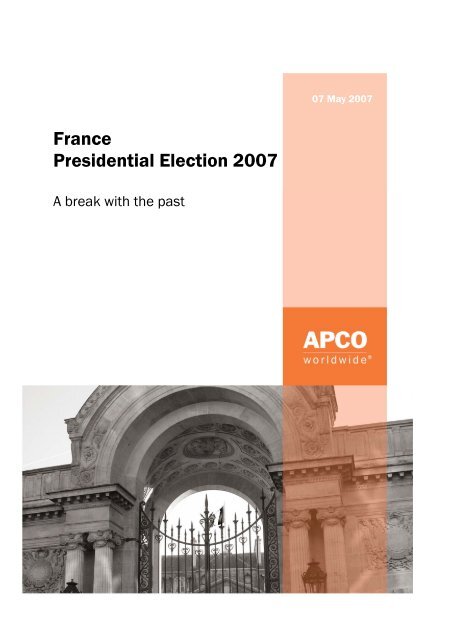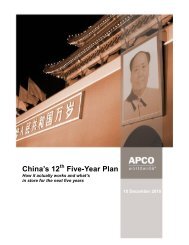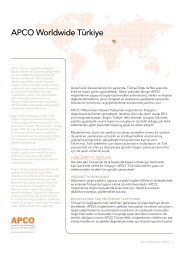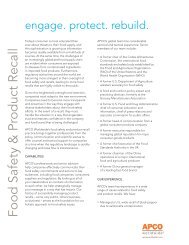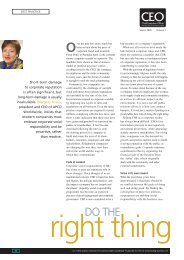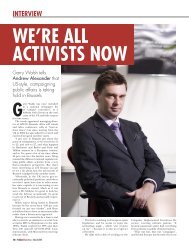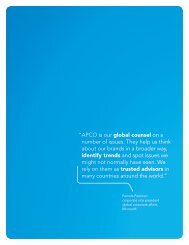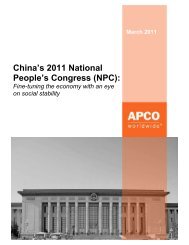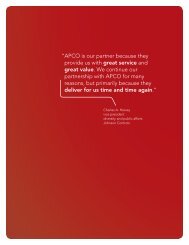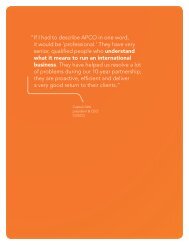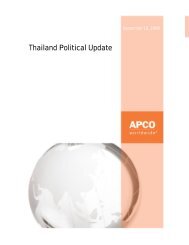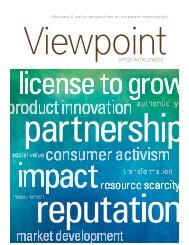France Presidential Election 2007 - APCO Worldwide
France Presidential Election 2007 - APCO Worldwide
France Presidential Election 2007 - APCO Worldwide
You also want an ePaper? Increase the reach of your titles
YUMPU automatically turns print PDFs into web optimized ePapers that Google loves.
<strong>France</strong><br />
<strong>Presidential</strong> <strong>Election</strong> <strong>2007</strong><br />
A break with the past<br />
07 May <strong>2007</strong><br />
1
Table of Contents<br />
OUTCOME 2<br />
BALLOT ANALYSIS 3<br />
NICOLAS SARKOZY AS PRESIDENT 5<br />
Programme for Government 6<br />
BIOGRAPHY OF NICOLAS SARKOZY 9<br />
Sarkozy’s network 11<br />
SARKOZY’S POSSIBLE GOVERNMENT 12<br />
Prime Minister 12<br />
Other key personalities 14<br />
1
OUTCOME<br />
Nicolas Sarkozy (UMP): 53.06% or 18.9 million votes,<br />
elected President of the French<br />
Republic<br />
Ségolène Royal (PS): 46.94% or 16.8 million votes<br />
Voter turn out: 84% or 37.254.242 out of<br />
44.472.363 registered voters.<br />
With a record participation level of 84% of registered voters casting their ballots in<br />
both rounds, the <strong>2007</strong> <strong>Presidential</strong> election marks a clear reconciliation between the<br />
French people and politics, bringing election turn-out back in line with those of 1974<br />
(87%) and 1981 (86%). This heightened participation highlights both the interest and<br />
expectations of the French people in an election seen by many as a “make or break”<br />
for <strong>France</strong>’s future.<br />
Nicolas Sarkozy’s victory marks a real rupture with the past and a profound renewal<br />
of the French right, both in terms of generation and ideology. This campaign has<br />
clearly shown a shift to the right at all levels of the political landscape, with the<br />
economy and market liberalisation measures taking the centre stage of the debate,<br />
alongside security and immigration issues. A new generation of leaders with no<br />
memory of World War II - more markedly to the right - has emerged, while extremist<br />
parties (on both the left and the right) have seen their scores fall to historical lows,<br />
from 40% in 2002 to below 20% in <strong>2007</strong>.<br />
The first round of the elections resulted in a resounding vote for the mainstream<br />
candidates with Nicolas Sarkozy, the Conservative (UMP) candidate winning 31.2%<br />
(11.5 million voters), followed by Ségolène Royal, from Socialist Party (PS), with<br />
25.9%. She was the first woman to make it to the second round of a <strong>Presidential</strong><br />
election.<br />
Sarkozy’s share of the vote in the first round, 11 percentage points above that of<br />
outgoing President Jacques Chirac in 2002, was the highest for a candidate of the<br />
right since 1974.<br />
The first round also saw the emergence of a third man, François Bayrou, and his UDF<br />
Union French Democracy, who won 18% of the vote on an anti-system and antiright/left<br />
divide platform. His emergence and determination to create a third political<br />
party complicated the second round of voting, as both candidates moved to the<br />
centre to win over Mr Bayrou’s 6.8 million first round supporters.<br />
2
BALLOT ANALYSIS<br />
In giving Nicolas Sarkozy a strong majority over his socialist contender, French voters<br />
have made a clear choice. His large victory provides him with the support needed to<br />
rapidly push forth the reforms he promised, while it further plunges the left into a<br />
deep identity crisis, initiated in 2002.<br />
Nicolas Sarkozy has led to victory an “ideologically sure footed” conservative party,<br />
clearly and openly campaigning on a right-wing platform. This is a remarkable break<br />
from the past, especially from the Chirac years, when the conservatives, seemingly<br />
scared of their own shadows, brought the country to a reform standstill, leaving it illequipped<br />
to adapt to a globalised economy.<br />
Sunday’s results clearly give Nicolas Sarkozy the mandate he asked for to carry out<br />
his reforms. His 53% of the vote provides him the political legitimacy to modernise<br />
<strong>France</strong>, while it should protect him, for a certain period anyway, from too strong a<br />
challenge form the street. As many commentators argue, “<strong>France</strong> has made a clear<br />
choice” and the new President enjoys a “real legitimacy to act” that “no corporatism<br />
can oppose”.<br />
Things are more difficult for the French left. Segolène Royal publicly conceded defeat<br />
remarkably quickly (a few minutes after 8:00 pm), immediately positioning herself as<br />
the rightful leader for the Socialists and the left for the June general elections. Armed<br />
with the close to 17 million voters who backed her, she clearly intends to lead the left<br />
in the legislative elections and play a centre role in the Socialist party’s up-coming<br />
aggiornamento. The question is whether other socialist leaders will let her do so.<br />
Segolène Royal had barely finished her concession speech when Dominique Strauss-<br />
Kahn, former Economics Minister and leader of the Social Democratic/reformist wing<br />
of the party, and Laurent Fabius, former Prime Minister, leader of the “No” campaign<br />
for the European constitution referendum and head of the leftist faction of the<br />
Socialist party, both violently attacked her and the way she had conducted her<br />
campaign.<br />
The French left was clearly disavowed on Sunday, losing the <strong>Presidential</strong> elections for<br />
the third time in a row. On the eve of the first round, all left-wing votes barely<br />
culminated at 36%, a far cry from the 50% needed to win the second round. The<br />
emergence of François Bayrou, campaigning on a platform close to the Conservatives<br />
on economic issues and close to the Socialists on social and institutional issues,<br />
clearly showed the yearning for an important part of the French left-wing electorate to<br />
find a modern and reform minded path, clearly not something the Socialist party was<br />
able to offer or project. Indeed, the Socialist party is in dire need to redefine and reinvent<br />
itself, finding itself caught between a rock and a hard place, unable to offer a<br />
3
clear alternative internally while risking being challenged on their left by the extreme<br />
left and on their right by François Bayrou, and his new Democratic Movement.<br />
Finally, the June 10 th and 17 th general elections should comfort Nicolas Sarkozy,<br />
providing him with the parliamentary majority he needs to carry out his programme.<br />
The first opinion polls conducted following Sarkozy’s election indicate between 35-<br />
37% support in favour of Sarkozy’s UMP, between 30 and 33% for the left, and<br />
between 12-15% for Bayrou’s new centrist Democratic Movement, while the Jean-<br />
Marie Le Pen’s National Front share of the electorate looks set to decrease further at<br />
8%.<br />
Furthermore, with a polling system for the general elections amplifying results to<br />
provide stable majorities, the UMP could well gain an absolute majority, providing<br />
President Sarkozy with the required parliamentary support.<br />
4
NICOLAS SARKOZY AS PRESIDENT<br />
It has been Nicolas Sarkozy’s ambition to become French President ever since he<br />
started his career. Despised and admired in equal measure, the former protégé of<br />
Jacques Chirac has now seen his dream come true and he will take his place at the<br />
Élysée Palace between the 10 th and 17 th of May. Sarkozy stated that he would<br />
takeover on the 16 th May.<br />
All political commentators agree that Sarkozy is no “ideologue”: his allegiance is to<br />
success and he has demonstrated brutal pragmatism to achieve this end. He was a<br />
highly combative interior minister and UMP leader, who has sharply divided opinion in<br />
<strong>France</strong> - not least by adopting a tough stance on immigration. In his campaign he<br />
successfully built on this image and appealed to working-class voters by<br />
concentrating his campaign on populist issues, such as immigration, national identity<br />
and crime, a tactic which successfully marginalized the more extreme Jean-Marie Le<br />
Pen.<br />
A political outsider, Sarkozy has cast himself as a modernizer and expressed a<br />
willingness to “make a dramatic break” with the past, in particular with <strong>France</strong>’s<br />
traditional ruling elite. Unlike most of the French ruling class, Mr Sarkozy did not go to<br />
the Ecole Nationale d'Administration (ENA), but trained as a lawyer, so he has been<br />
able to successfully champion this concept and tap into the disaffection and loss of<br />
trust with “politics as usual” in <strong>France</strong>.<br />
Sarkozy’s election brings to power a younger generation representing a significant<br />
change from that of his predecessor. His teams will be young, some of them only in<br />
their 30s, and there will be more women making up what is expected to be a<br />
compact team limited to 15 ministers. Sarkozy wants a reduced cabinet to increase<br />
effectiveness and he plans to evaluate the work of his ministers each year.<br />
There is a clear desire for social and economic “change” in <strong>France</strong> and Sarkozy has,<br />
in part, been elected to tackle the necessary reforms. The French are convinced that<br />
reform is needed. However, they are not agreed on how reform should be brought<br />
about and the significant opposition which has prevented radical renewal of the<br />
“French Model” for the last twenty years remains. There are still too many people<br />
who are too well protected by the state to want change. So the question to be<br />
answered is how Sarkozy will implement the changes he acknowledges <strong>France</strong><br />
needs. With no legacy of a French political machine capable of taking on the big<br />
problems, Mr Sarkozy may find it just as hard as his predecessor Mr Chirac did, to<br />
push through changes in <strong>France</strong>. Experience has shown that any serious attempts to<br />
liberalise <strong>France</strong>’s labour market are likely to provoke massive protests in the<br />
streets.<br />
The danger for Mr Sarkozy is that opposition to his reform plans could become<br />
intertwined with perceptions of Sarkozy himself. Francois Bayrou, the third candidate<br />
5
from the UDF party who was eliminated in the first round of voting, described Sarkozy<br />
as a man "with a taste for intimidation and threats," raising concerns about the<br />
divisive effect Sarkozy’s presidency could have on the country. His actions as interior<br />
minister and abrasive personality have engendered a powerful “Anyone but Sarkozy”<br />
feeling among a sizeable part of the electorate. This is especially evident in the<br />
troubled suburbs, where the former interior minister made enemies by calling young<br />
criminals "scum" and became identified with an unpopular police force, and could<br />
exacerbate opposition for any unpopular reform plans.<br />
Sarkozy will need all of his hard work, cunning and ability as a skilled orator and<br />
media-savvy political operator if he is to introduce the reforms <strong>France</strong> needs.<br />
Programme for Government<br />
Hailed by the Economist as "<strong>France</strong>'s chance", the man to bring about Thatcherite<br />
economic reforms, only Sarkozy, out of the main candidates, has campaigned to<br />
reform the barriers to job creation and put <strong>France</strong> back to work. Although he<br />
recognizes the need for urgent reform in <strong>France</strong> he has been wary of sounding too<br />
radical or too specific in his commitments to reform, for fear of alienating an<br />
electorate, which is hostile to globalization and views the economic "liberalism'' of<br />
America and Britain with contempt.<br />
That said, he is determined to make the French work harder and pay less tax to<br />
restore the value of work and lift <strong>France</strong>’s sluggish economic growth rate. In an<br />
interview with Le Monde, Mr Sarkozy labelled this his “priority of priorities”. While this<br />
reflects a more free market approach to the economy Mr Sarkozy will, like Mr Chirac,<br />
continue to favour a strong industrial policy. He is expected to interfere less but will<br />
likely continue the tradition of government intervention by protecting national<br />
champions. As finance minister in 2004 he called for “economic patriotism” rescuing<br />
Alstom, <strong>France</strong>'s world-leading power and high-speed rail conglomerate, from<br />
bankruptcy with taxpayers’ money.<br />
In line with EU better regulation principles, Sarkozy promises that there will be fewer<br />
laws, but that they will be applied.<br />
Economic Reform<br />
Sarkozy has recognised that <strong>France</strong> must undertake radical reforms if it is to raise<br />
growth and cut unemployment, which has not been under 8% for 25 years. According<br />
to his diagnosis of <strong>France</strong>’s economic ills, the French do not work enough: young<br />
people enter the workforce late; experienced people retire early; the standard<br />
working week has been reduced to 35 hours.<br />
To get <strong>France</strong> back on it feet, he plans to circumvent the 35-hour week by offering<br />
employees new tax incentives to earn more money through working longer hours.<br />
This he believes can be achieved by rewarding overtime with an increase of 25%<br />
6
more than a normal hour and exonerating all overtime from social charges and<br />
income tax. A believer in minimizing taxation he plans to boost consumer spending by<br />
leaving more money in employees’ pockets through a reduction in the overall tax<br />
burden by four percentage points over 10 years, which will to bring <strong>France</strong> into line<br />
with the European average.<br />
A second major cause of unemployment, in Sarkozy’s view, is that the burden of the<br />
French welfare state falls predominantly on employers, thereby resulting in less jobs.<br />
Mr Sarkozy plans to shift the cost of the welfare state – especially health care and<br />
unemployment pay – onto VAT. The idea has detractors on the right and may be in<br />
conflict with EU rules.<br />
It is also planned that these tax cuts could be partly financed by reducing state<br />
spending. The cost of salaries and pensions for civil servants accounts for 45 per<br />
cent of the government’s budget. To reduce this burden he proposes that only one<br />
out of every two civil servants who retires should be replaced.<br />
Sarkozy has indicated that he will continue dialogue with the unions but has planned<br />
a series of measures which are designed to curb their powers and prevent them from<br />
undermining his reform plans. He intends to impose on employers and unions an<br />
“institutionalised” social dialogue, consisting of a period of six months negotiations.<br />
Four “summits” bringing employers and unions together will be organized, on<br />
purchasing power, work contracts, salary equality for men and women, and reform of<br />
social democracy. He also plans to limit the effectiveness of strikes by bringing in a<br />
law to have a secret vote after 8 days strike and a law guaranteeing a minimum level<br />
of service of during strikes.<br />
Europe<br />
Sarkozy’s vision is for <strong>France</strong> to reclaim its place in a more effective Europe. He is not<br />
overtly keen on the old Franco-German alliance - but upset new EU members by<br />
saying those with lower taxes than old Europe should not receive EU subsidies. He<br />
has a pragmatic approach to the constitution proposing a simplified treaty, limited to<br />
institutional questions, to be ratified by the French Parliament. He recently criticized<br />
the European Central Bank and would like to reinforce the powers of the Eurogroup<br />
to put pressure on the ECB and have more influence over monetary and exchangerate<br />
policies.<br />
Sarkozy is openly hostile to Turkey joining the EU, and sees Europe as a bulwark to<br />
globalisation, not to let in globalisation as a Trojan horse. He has been critical of the<br />
European Commission for promoting competition at the expense of Europe’s<br />
industrial base and wants to rehabilitate the “community preference”, calling on the<br />
EU to adopt more protectionist policies to defend against competition from emerging<br />
economies. Mr Sarkozy’s Gaullist trait of putting “<strong>France</strong> first” may put him in conflict<br />
with Brussels and other national capitals, as he plans to put in place an industrial<br />
policy which will concentrate efforts on strategic sectors to combat delocalization.<br />
7
International Relations - the US and Russia<br />
He is more of an Atlanticist than most French politicians, although he was prudent to<br />
downplay his open admiration of America during the election campaign. He will try to<br />
repair <strong>France</strong>’s broken relationship with the US caused by tension over Iraq.<br />
Interestingly, Nicolas Sarkozy made an important reference to the United States in<br />
his first speech following his election, stating that <strong>France</strong> would always stand by the<br />
US when the US would need her, while insisting upon the importance for friends to<br />
clearly and simply state their differences. “I want to appeal to our US friends, to let<br />
them know they can count on our friendship, forged in the tragedies of history that<br />
we have always confronted together. I want to tell them that <strong>France</strong> will always stand<br />
by them when they’ll need her. But I also want to tell them that friendship means<br />
that friends can also think differently, and that the US has a duty not to stand in the<br />
way of the fight against climate change, but should, to the contrary, take the lead on<br />
this issue, because what is at stake is the fate of all mankind”.<br />
Russia's relationship with <strong>France</strong> is also set to change, to a probably less<br />
accommodating stance. During his 12 years in office, Mr Chirac proved a reliable ally<br />
to Presidents Boris Yeltsin and Vladimir Putin, often supporting them in international<br />
disputes. Although not expended to publicly criticize Putin he will be firmer on human<br />
rights issues. It is also expected that, as a supporter of common EU defense and<br />
energy policies, his influence will have an impact which will directly affect the EU’s<br />
relations with Russia.<br />
Environment<br />
Sarkozy has announced a conference on the environment to bring together NGOs,<br />
industrial groups and social partners. He has indicated that a new, overarching<br />
ministry will bring together sustainable development, water, energy and transport<br />
issues into one portfolio. A possible new “green tax” which would be applied to a<br />
great number of polluting energies, along the lines of a revisited “carbon tax”, has<br />
been touted and the new President has publicly endorsed the creation of a World<br />
Environmental Organisation.<br />
Immigration<br />
This has been a major theme during the campaign. It looks certain that a new<br />
ministry for “immigration and national identity” will be created, a proposition which<br />
has caused real debate. As interior minister Sarkozy imposed strict measures on<br />
illegal immigrants, a policy he looks set to reinforce by introducing annual limits on<br />
the number of immigrants and stricter measures on regrouping families and the<br />
regularization of immigrants without papers. Further more, while continuing the fight<br />
to reduce illegal immigration, a Sarkozy government is likely to pursue selective<br />
immigration favouring arrival of qualified workers<br />
8
BIOGRAPHY OF NICOLAS SARKOZY<br />
Nicolas Sarközy de Nagy Bocsa was born on January<br />
28th, 1955 to a French mother and a Hungarian father.<br />
Unlike most of <strong>France</strong>'s ruling class, Sarkozy was an<br />
average student, and did not study at the elite Ecole<br />
Nationale d'Administration (ENA) before heading into<br />
ministerial office. After qualifying as a lawyer, Nicolas<br />
Sarkozy entered into practice for a short time at the Paris<br />
firm Arnaud Claude, specialising in property.<br />
He has had virtually no career outside politics having<br />
become a city councillor at the age of 22. At 19, he joined the RPR - le<br />
Rassemblement pour la République - created by his early political mentors Charles<br />
Pasqua and Jacques Chirac. His talent, especially as a speaker, was quickly noticed.<br />
In 1981, Chirac launched his first presidential bid and Sarkozy campaigned for him<br />
at the head of a group of young supporters. In 1983, aged just 28, he was elected<br />
<strong>France</strong>'s youngest mayor of the affluent<br />
Parisian suburb of Neuilly sur Seine. Six Nicolas Sarkozy: Key dates<br />
years later he became a Member of<br />
1993 - 1995: Budget Minister<br />
Parliament for the Hauts-de-Seine<br />
department.<br />
2002 - 2004: Minister for the Interior<br />
2004: Minister of Finance<br />
He served as mayor of the affluent Paris<br />
2005 – <strong>2007</strong>: Minister of State for the Interior<br />
suburb of Neuilly from 1983 to 2002,<br />
then became interior minister. He also<br />
had a brief spell as finance minister in 2004. Throughout the 1980s Sarkozy<br />
cultivated a network of confidantes in politics and business. Among his allies were<br />
the business leaders Martin Bouyges and Bernard Arnault. He also aligned himself<br />
strongly with the Chiracs, becoming popular with wife Bernadette and winning the<br />
affections of daughter Claude. When Chirac stood for election in 1988, Sarkozy again<br />
campaigned.<br />
In 1993 the young politician took on his first government brief, Prime Minister<br />
Edouard Balladur making him Budget Minister. He was one of the government's<br />
youngest and most dynamic ministers - and one of its most media-friendly.<br />
Although he was initially a protégé of President Chirac and an active supporter, the<br />
two fell out dramatically when Mr Sarkozy backed Balladur, Chirac’s rival, for the<br />
presidency in 1995. It was a bad choice and a slight that has never been forgotten.<br />
9
He paid dearly for his treachery. Excluded from the President's inner circle, Sarkozy<br />
was now forgotten. A potential return came in the 1999 European elections when he<br />
stood for the RPR. It turned out to be a failure, he came only third.<br />
Sarkozy withdrew briefly from political life, working as a lawyer and spending his<br />
spare time writing and learning English. But his ambition remained strong and in<br />
2001 he released his political manifesto Libre before starting again to get his career<br />
back on track.<br />
Sarkozy worked his way back into Chirac's team helping him win re-election in 2002,<br />
making possible his return. He was made interior minister, the second most<br />
important position in government, by the Prime Minister Jean-Pierre Raffarin. He set<br />
security as his priority and soon became the government's star media performer, as a<br />
regular guest on television, with his straight talking and tough attitude.<br />
Following the cabinet reshuffle of 31 March 2004, Sarkozy was moved to the<br />
position of Finance Minister. Tensions continued to build between Sarkozy and Chirac<br />
and within the UMP party, as Sarkozy became head of the party after the resignation<br />
of Alain Juppé. In accordance with an agreement with Chirac, he resigned his position<br />
as minister. Sarkozy’s intentions to seek the presidency in <strong>2007</strong> divided the UMP<br />
between sarkozystes, such as Sarkozy's “first lieutenant”, Brice Hortefeux, and Chirac<br />
loyalists, such as Jean-Louis Debré. Despite these divisions on 2 June 2005 Sarkozy<br />
was reappointed Minister of the Interior in the government of Dominique de Villepin<br />
without resigning from the UMP leadership, thus paving the way for his ascent to the<br />
Presidency.<br />
10
Sarkozy’s network<br />
Looks set to be the fourth member of US-looking European modernizers. Angela<br />
Merkel, the German chancellor, José Manuel Barrosso, president of the European<br />
Commission , and Tony Blair, British prime minister have privately discussed a<br />
“strategic partnership” with Mr Sarkozy to promote economic reform and build a<br />
more outward looking Europe.<br />
11
SARKOZY’S POSSIBLE GOVERNMENT<br />
Sarkozy’s first government will probably be the first illustration of his pledge to do<br />
things differently, to reflect French society and to show openness to other political /<br />
ideological currents. His government is expected to be compact, with only about 15<br />
Ministers. Seven to eight of these ministerial positions should be taken up by women.<br />
Secretaries of State / Junior Ministers are not expected to be appointed before the<br />
results of the June general elections.<br />
Prime Minister<br />
The Prime Minister is named by the President, reflecting the majority returned to the<br />
National Assembly.<br />
François Fillon, Mr Sarkozy’s right-hand man in charge of his<br />
legislative programme. He is widely seen as being Sarkozy’s most<br />
likely choice as Prime Minister even if he has contenders.<br />
Born in 1954 in Sarthe, François Fillon studied law and political<br />
science. A minister several times during the governments of<br />
Balladur and Juppé, he resigned as deputy for Sarthe in 2002 to<br />
become Minister for Social Affairs and then Minister for Education under Jean-Pierre<br />
Raffarin. He carried out a series of contested reforms (retirement, education). A<br />
potential candidate for prime minister he quit<br />
Raffarin’s government at the same time as<br />
Raffarin, who he had fallen out with. On<br />
departing he was very critical of Chirac’s<br />
government “One will remember nothing of<br />
Chirac, except for my reforms”. Defeated in the<br />
regional elections in March 2004, where he ran<br />
in the region Pays-de-la-Loire, he became a<br />
senator for Sarthe in 2005.<br />
François Fillon: Key dates<br />
1981 - 2002 : RPR Deputy for Sarthe<br />
1993 - 1995 : Minister for Higher Education<br />
1995 - 1997 : Minister for Technology &<br />
Communication<br />
2002 - 2004 : Minister for Social Affairs<br />
2004 - 2005 : Minister for Education<br />
Since Nov. 2004 : Political adviser to UMP<br />
Role in the UMP Ex-séguiniste who became a<br />
supporter of Balladur and then Chirac, he is Since 2005 : Senator for Sarthe<br />
now close to Nicolas Sarkozy. He became his<br />
political adviser in November 2004, but was not close to the minister of the interior.<br />
He has however supported Sarkozy without reserve.<br />
Ambitions Will be rewarded with a position in government following his firm support<br />
for Sarkozy.<br />
12
Jean-Louis Borloo, In the running to be Prime Minister due to his<br />
track record and popularity<br />
Born in April 7th, 1951 in Paris, he was a successful French<br />
lawyer in the 1980s and later became president of the<br />
Valenciennes Football Club. In 1989, he was elected mayor of<br />
Valenciennes, and then toward politics. From 1989 to 1992 he was a Member of the<br />
European Parliament and since April 1993, he<br />
has been a Member of Parliament of the 21 st<br />
Circonscription. Jean-Louis Borloo is a member<br />
of the Law Commission and also the president<br />
of the Study group “Future of the Banking<br />
System”. From 2002 to 2004, he was the<br />
Minister of Urban Development and<br />
Renovation within the government of Jean-<br />
Pierre Raffarin. He is currently the Minister of<br />
Employment, Social Cohesion and Housing in <strong>France</strong>, as well as a member of the<br />
Union for a Popular Movement (UMP) and from 2005, the co-president of the Radical<br />
Party, alongside André Rossinot. He recently introduced a five-year plan of social<br />
cohesion, which is centred on three axes: equal opportunity, housing and<br />
employment.<br />
Ambition Jean-Louis Borloo is one of the most appreciated French politicians.<br />
Following a recent TV campaign to align with Nicolas Sarkozy he has a chance to<br />
become the next Prime Minister. According to the political newsletter “Le Bleu”, Mr<br />
Borloo said “the question is to know if Sarkozy will appoint me to Matignon now or<br />
within two years”.<br />
Xavier Bertrand, The outsider for the position<br />
Jean-Louis Borloo: Key dates<br />
1989 - 1992 : Member of the European<br />
Parliament<br />
2002 - 2004 : Minister Delegate for Urban<br />
Development and Renovation<br />
Since 2004 : Minister for Employment, Social<br />
Cohesion and Housing<br />
Born March 21, 1965 in Châlons-sur-Marne, Marne. On June 16,<br />
2002 he was elected deputy for the UMP Party (2002-<strong>2007</strong>). On<br />
March 31, 2004, he was chosen Secretary of State for the health<br />
insurance (junior minister for health) in the third government of Jean-<br />
Pierre Raffarin and on June 2,<br />
2005 he rose to the senior Xavier Bertrand: Key dates<br />
position of Minister of Health in the first 2004 - 2005: Junior Minister for Health<br />
government of Dominique de Villepin.<br />
2005-Present : Minister for Health<br />
Role in the UMP Announced his support for Sarkozy’s presidential election bid on<br />
29th November 2006 and was nominated spokesperson for the campaign on 15<br />
January <strong>2007</strong>. He quit his government post on 26 March <strong>2007</strong> to dedicate himself<br />
fully to the campaign. If not appointed Prime Minister it is likely he will be made<br />
Minister of Social Affairs.<br />
13
Other key personalities<br />
General Secretary of the Elysée<br />
The General Secretary is a key post, despite the lack of public visibility it brings, as<br />
the General Secretary is closest to the President and advises him on a daily basis.<br />
Claude Guéant, the frontrunner to become the General Secretary of<br />
the Elysée<br />
Born in April 1947 in Vimy (Pas-de-Calais), Claude Guéant is a former<br />
Student of the famous École Nationale d'Administration (ENA),<br />
(Promotion Thomas More, 1969-71). After a brilliant career of<br />
“Prefect” and as the Deputy-Head of Cabinet of the Ministry of Interior<br />
under Mr Charles Pasqua, Claude Guéant became from 1994 to 1998 the Director<br />
General of the “Police Nationale”. Respected by his peers, he’s considered by<br />
Nicolas Sarkozy as the “best one”. He is to Nicolas Sarkozy what Alain Juppé was to<br />
Jacques Chirac. In 2002, when Sarkozy was appointed Minister of the Interior,<br />
Claude Guéant became Head of the Cabinet. From April to December 2004, he<br />
followed Sarkozy to the Ministry of Economy, Finances and Industry retaining his role<br />
as Head of Cabinet.<br />
Role in the UMP He’s Nicolas Sarkozy’s Director of Campaign and is totally devoted to<br />
his cause.<br />
Ambition Claude Guéant said many times that he absolutely doesn’t have the<br />
ambition to become the future Prime Minister. On the other hand, he has indicated<br />
that he would appreciate the role of Secretary General of the Elysée.<br />
Minister of the Interior<br />
This is one of the most important governmental cabinet positions as the Ministry of<br />
the Interior is a critical ministry for the affairs of the country and the organization of<br />
elections.<br />
It is widely rumoured that Brice Hortefeux, Nicolas Sarkozy’s longtime friend and<br />
“right lieutenant” could be appointed Minister of the Interior. However, some have<br />
also anticipated that Sarkozy may prefer to entrust the party leadership of the UMP to<br />
him. Another possible candidate is Xavier Bertrand, spokesman for Sarkozy’s<br />
<strong>Presidential</strong> campaign, as he looks assured to be rewarded with a Ministerial<br />
promotion.<br />
14
Brice Hortefeux, potential Minister of the Interior<br />
Born in May 11 th 1958 in Neuilly-sur-Seine, Brice Hortefeux<br />
graduated from the Institut d’Etudes Politiques de Paris (Sciences<br />
Po). He’s member of the UMP and the current Minister-Delegate for<br />
Local Government at the Ministry of the Interior. He was formerly<br />
Member of the European Parliament for the Region “Centre and sits<br />
on the European Parliament's Committee on International Trade.<br />
Role in the UMP Since 2002, Brice Hortefeux has been a member of the UMP<br />
political bureau and is considered Nicolas Sarkozy’s first “lieutenant”. The two have<br />
been extremely close since they met as young members of the RPR in 1976. Has<br />
stated his desire to be part of the future government and is tipped to become the<br />
next Minister of the Interior.<br />
The following is an overview of the candidates that are rumoured to be in the running<br />
for the ministerial positions:<br />
Interior<br />
Francois Baroin<br />
•Current Minister of the Interior<br />
•A long-time ally of Jacques Chirac<br />
Brice Hortefeux<br />
•(see biography above)<br />
Xavier Bertrand<br />
•(see biography above)<br />
Pierre Albertini<br />
•UDF Mayor of Rouen and MP of the 2nd Pierre Albertini<br />
•UDF Mayor of Rouen and MP of the 2 Circonscription of<br />
Seine-Maritime<br />
•Member of the Financial Commission<br />
•His appointment would send a strong signal of the<br />
independence of justice in Sarkozy’s government<br />
nd Circonscription of<br />
Seine-Maritime<br />
•Member of the Financial Commission<br />
•His appointment would send a strong signal of the<br />
independence of justice in Sarkozy’s government<br />
Rachida Dati<br />
•UMP member and spokesperson for Sarkozy<br />
•In 2002 she became Sarkozy’s adviser on immigration<br />
Patrick Devedjian<br />
• MP of the 13th Circonscription of Hauts-de-Seine<br />
•UMP Mayor of Antony (Hauts-de-Seine)<br />
•Proximity to Sarkozy may rule him out of this position<br />
Philippe Houillon<br />
•MP of the 1st Circonscription of Val d’Oise<br />
•President of the Law Commission<br />
Justice<br />
15
Economy<br />
Xavier Bertrand<br />
(see biography above)<br />
Jean-Louis Borloo<br />
• (see biography above)<br />
Gérard Larcher<br />
•Formerly Minister for Employment, Work and Training<br />
of young people<br />
•Former Vice-President of the Senate<br />
Anne Lauvergeon<br />
•Chairman of Areva<br />
•8th most powerful woman in the world (according to Forbes)<br />
•Onetime political adviser to former French President Mitterrand<br />
•Her appointment would be considered a sign of opening<br />
Pierre Méhaignerie<br />
•UMP Member and MP of the 5th Circonscription of Ile-et-Vilaine<br />
•Formerly an ally of Jacques Chirac<br />
•An authority on financial matters, has been President of the<br />
Finance Committee of the Assembly since 2002<br />
Employment<br />
It is anticipated that Michèle Alliot-Marie, currently the Minister for Defence, will<br />
become Minister for Foreign Affairs. However, Alain Juppé, former prime minister, is<br />
also in line for the post, if he is not made President of the National Assembly.<br />
Foreign<br />
Affairs<br />
Michele Alliot-Marie<br />
•Current Minister of Defence since 2002<br />
•First woman to lead a major French political party – RPR 1999<br />
Alain Lamassoure<br />
•Member of UMP<br />
•Member of European Parliament since 1999<br />
•Former Budget Minister and Minister for European Affairs<br />
Alain Juppé<br />
•UMP mayor of Bordeaux<br />
•Former Prime Minister from 1995-1997<br />
Michel Barnier<br />
•Former French Minister for Foreign affairs, and<br />
Environment<br />
•Former European Commissioner for Regional Policy in the<br />
Prodi Commission<br />
Gérard Longuet<br />
•Senator for Meuse<br />
•Member of UMP and political adviser to Sarkozy<br />
•Forced to resign as Minister for Telecommunications in<br />
1994<br />
Defence<br />
16
Enterprise-<br />
Trade<br />
Alain Juppé<br />
•UMP mayor of Bordeaux<br />
•Former Prime Minister from 1995-1997<br />
Nathalie Kosciusko-Morizet<br />
•MP of the 4th Circonscription of Essonne<br />
•A rising star of the UMP party<br />
•Tipped for the job due to her expertise in<br />
ecology and position as General Secretary for<br />
Ecology within the UMP<br />
Antoine Rufenacht<br />
•UMP Mayor of Le Havre<br />
•President of the local city community of Le Havre<br />
•Remains close to Jacques Jacques Chirac<br />
Health<br />
Christian Blanc<br />
•UDF MP of the 3rd Christine Lagarde<br />
•Current Minister of Trade – highly regarded in <strong>France</strong> and<br />
Internationally<br />
•Former Chairman of Baker McHenzie<br />
•Shares similar views with Sarkozy on globalisation<br />
Christian Blanc<br />
•UDF MP of the 3 Circonscription of Yvelines<br />
•Former President of Merrill Lynch <strong>France</strong><br />
rd Christine Lagarde<br />
•Current Minister of Trade – highly regarded in <strong>France</strong> and<br />
Internationally<br />
•Former Chairman of Baker McHenzie<br />
•Shares similar views with Sarkozy on globalisation<br />
Circonscription of Yvelines<br />
•Former President of Merrill Lynch <strong>France</strong><br />
Eric Besson<br />
•MP of the 2nd Eric Besson<br />
•MP of the 2 Circonscription of Drôme<br />
•Former Secretary General for the Economy with the PS<br />
nd Circonscription of Drôme<br />
•Former Secretary General for the Economy with the PS<br />
Environment,<br />
Sustainable<br />
development,<br />
Transport and<br />
Energy<br />
Roselyne Bachelot<br />
•Member of the European Parliament for the West of <strong>France</strong><br />
•Former Minster of Ecology and Sustainable Development<br />
Christine Boutin<br />
•MP of the 10th Circonscription of Yvelines<br />
•Member of UMP<br />
Valérie Pécresse<br />
•MP of the 2nd Christine Boutin<br />
•MP of the 10th Circonscription of Yvelines<br />
•Member of UMP<br />
Valérie Pécresse<br />
•MP of the 2 Circonscription of Yvelines<br />
•Regional Advisor of Ile-de-<strong>France</strong><br />
•Former Chirac supporter who has successfully integrated with<br />
Sarkozy<br />
nd Circonscription of Yvelines<br />
•Regional Advisor of Ile-de-<strong>France</strong><br />
•Former Chirac supporter who has successfully integrated with<br />
Sarkozy<br />
17
Education,<br />
Culture<br />
Bernard Laporte<br />
•Coach of the French Rugby team<br />
•Close friend of Sarkozy<br />
Laurent Wauquiez<br />
•(see biography above)<br />
Public<br />
Authorities<br />
Dominique Bussereau<br />
•Current Minister of Agriculture<br />
•MP of the 4th Circonscription of Charente-Maritime<br />
Rachida Dati<br />
•UMP member and spokesperson for Sarkozy<br />
•In 2002 she became Sarkozy’s adviser on<br />
immigration<br />
Roger Karoutchi<br />
•Senator of Hauts-de-Seine<br />
•Member of the Financial and the Budget<br />
Commission<br />
Xavier Darcos<br />
•UMP Mayor of Perigueux<br />
•Member of the Academy of Moral and Political Sciences<br />
Renaud Donnedieu de Vabres<br />
•Current Minister of Culture<br />
•MP of the 1st Circonscription of indre-et-Loire<br />
Michel Thiolliere<br />
•Senator of Loire (Rhône-Alpes)<br />
•Vice-President of the Commission of Cultural Affairs<br />
Youth,<br />
Sport<br />
Jerome Chartier<br />
•MP of the 4th Circonscription of Val d’Oise<br />
•Member of the Financial Commission<br />
Pierre Albertini<br />
•MP of the 2nd Pierre Albertini<br />
•MP of the 2 Circonscription of Seine-Maritime<br />
•Member of the Financial Commission<br />
nd Circonscription of Seine-Maritime<br />
•Member of the Financial Commission<br />
Overseas<br />
Territories<br />
18


